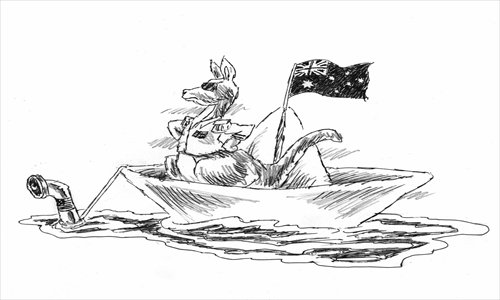HOME >> OP-ED
Sydney doesn’t need to bow knee to outdated Pax Americana
By Pang Zhongying Source:Global Times Published: 2013-11-4 22:33:01

Illustration: Peter C. Espina/GT
Australia's recent plans of naval buildup have attracted wide attention. Military strength has been the major shield the US and its allies such as Australia have employed since the 1990s to guard the order in the Asia-Pacific region or even the world.
By depending on its military supremacy in the Asia-Pacific region, the US draws a bottom line for other countries in this region especially in terms of economic activities: The Pax Americana, which aims to sustain the prosperity of this region under the dominance of the US, has to be maintained.
In this Pax Americana ideology, it is the military strength of the US and its Asia-Pacific allies that fuels the operation of the security framework of this region. This dominance is not allowed to be shared by other countries that do not belong to the US-led alliance.
This is also the reason why Washington came up with the "pivot to Asia" policy after the power balance in the Asia-Pacific region started to change gradually. In recent years, economic developments have led to the shift of power in this region, which will probably deprive the US of its dominance, an unacceptable consequence for Washington.
Not being part of the US-led alliance, China will be continuously blamed for trying to "shift the power" by seeking any development of its military strength. But since China switched to the fast lane at the end of the 1970s, its development has been completely peaceful without any intent to challenge or reverse Washington's dominance in the Asia-Pacific region.
China's peaceful rise, which has produced massive economic assets, is benefiting not only the US, but also its allies. China and the US are each other's largest trade partner. An economically reciprocal relationship has also been built between China and Australia. China has become Australia's biggest trade partner since 2009.
But high-level economic integration seems to make little impact on the US and Australia's geopolitical ideology. China and the US-led alliance are still in conflict with each other over politics, regional security and strategic thinking.
Thus, a strange phenomenon in international relations has come into being: Most Asia-Pacific countries, which include Washington's allies, are still relying on the US hegemony in this region in terms of security and military affairs, but they are heading to China for more investments and bigger market. Australia is no doubt one of the "pioneers." The prospects of this situation are not promising. It has already imposed great challenges on these countries, especially Australia.
The US has also realized this dramatic change, to which it responds with the policy of "rebalancing." Washington tries to reaffirm the bottom line of China's rise, which is not allowed to jeopardize US dominance in this region.
After its economy has declined, the US has become more reliant on its allies such as Australia, which is profiting by doing business with China, but in the meantime, is willing to sustain a US-led framework instead of trying to explore new possibilities.
As Washington's major ally in the Asia-Pacific region, Australia is sparing no effort in assisting the US to realize its goal of "pivot to Asia." But it had better realize that China will not tolerate the US and its allies profiting from China economically, while containing it in politics and military affairs.
In order to deal with this unbalanced scenario, Chinese leadership has developed a new thought in terms of diplomacy. Beijing is dedicated to building up "a community of common destiny" with its neighbors, which will help sync their economic and political relationships.
Australia should keep in mind that grudgingly supporting the outdated regional order will not last long. It has already created a security dilemma that enmeshes itself. Australia needs to step out of the old mind-set and take initiatives to contribute to the formation of a new Asia-Pacific framework.
The author is a professor at the School of International Studies, Renmin University of China. opinion@globaltimes.com.cn
Posted in: Viewpoint